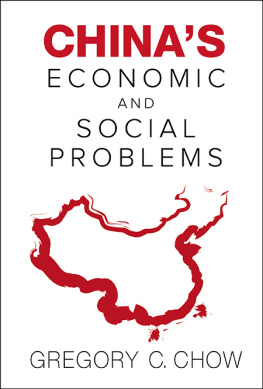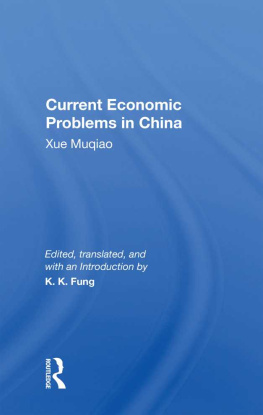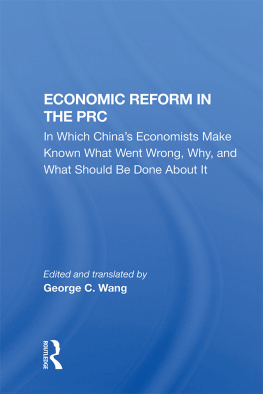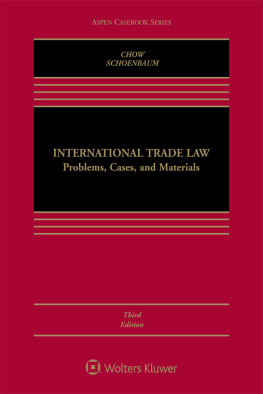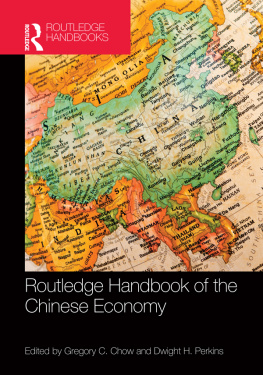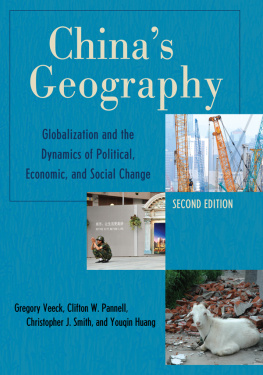CHINAS
ECONOMIC
AND
SOCIAL
PROBLEMS
CHINAS
ECONOMIC
AND
SOCIAL
PROBLEMS
GREGORY C. CHOW
Princeton University, USA
Published by
World Scientific Publishing Co. Pte. Ltd.
5 Toh Tuck Link, Singapore 596224
USA office: 27 Warren Street, Suite 401-402, Hackensack, NJ 07601
UK office: 57 Shelton Street, Covent Garden, London WC2H 9HE
Library of Congress Cataloging-in-Publication Data
Chow, Gregory C., 1929
Chinas economic and social problems / by Gregory C. Chow (Princeton University, USA).
pages cm
Includes bibliographical references and index.
ISBN 978-9814590402 (hardcover : alk. paper) -- ISBN 978-9814590419 (pbk. : alk. paper)
1. China--Economic conditions--2000 2. China--Economic policy--2000 3. China--Foreign
economic relations. 4. China--Social conditions--2000 I. Title.
HC427.95.C4893 2014
330.951--dc23
2014012247
British Library Cataloguing-in-Publication Data
A catalogue record for this book is available from the British Library.
Copyright 2013 by World Scientific Publishing Co. Pte. Ltd.
All rights reserved. This book, or parts thereof, may not be reproduced in any form or by any means, electronic or mechanical, including photocopying, recording or any information storage and retrieval system now known or to be invented, without written permission from the Publisher.
For photocopying of material in this volume, please pay a copying fee through the Copyright Clearance Center, Inc., 222 Rosewood Drive, Danvers, MA 01923, USA. In this case permission to photocopy is not required from the publisher.
In-house Editor: Lu Shan
Typeset by Stallion Press
Email:
Printed in Singapore
Preface
For decades since I received my PhD degree in economics from the University of Chicago, I was active as an academic economist and an economic adviser to the government of Taiwan from the mid-1960s to the late 1970s and to the government of China from the 1980s to the 1990s. Both kinds of work required serious research. In recent years, my interest has changed to thinking about broader economic issues and problems and possible solutions to these problems. I have served as a columnist for the First Financial Daily, and later for the Southern Metropolitan Daily, the Chinese edition of Financial Times, the Chinese edition of South China Morning Post in Hong Kong and Commercial Times in Taiwan.
I have published two books as collections of newspaper articles. They are (1) Interpreting Chinas Economy with both Chinese and English editions published by World Scientific and a second Chinese edition published by Zhongxin, and (2) China as a Leader of the World Economy, with editions in both languages published by World Scientific and a second Chinese edition published by Truth & Wisdom Press in Shanghai. This book consists of more recent newspaper articles. I hope that readers will provide me with critical comments. This book has four parts, first on economic problems, the second on economic studies, the third on economic policy and the fourth on social problems. By glancing through the table of contents, the reader can get a birds eye view of the topics covered.
In writing the chapters, I have benefited from critical comments by many friends, including in particular Professors Hu Shouwei and Wang Zeke of Zhongshan University, Professor Shen Yan of Peking University, Professor Niu Linlin of Xiamen University and Dr. Wang Yi of the Peoples Bank of China. I am also indebted to Ms. Elizabeth Lie of World Scientific who made a serious effort in editing and in improving the exposition of this book. The financial support from the Gregory C. Chow Econometric Research Program at Princeton University is gratefully acknowledged.
Gregory C. Chow
Princeton, NJ, USA
November 28, 2013
Contents
CHAPTER

Historical Tradition and the Present-Day Chinese Economy
In order to discuss this topic, I first refer to an article by Professor Lin Man-houng of Academia Sinica and National Taiwan University, Important characteristics of Chinas traditional economy, (Taiwan: Academia Sinica, Proceedings of Humanities and Social Science, February 1992) and then raise some relevant questions for the readers consideration.
The questions discussed in the above article by Professor Lin include:
1.How traditional agriculture and light industry were developed which have affected these productive activities today.
2.How private ownership of land was developed in the period of Warring States while farmers had used the land belonging to the kings during the previous Zhou dynasty.
3.How the family system was formed and how family members worked together that affect the Chinese economy today.
4.How commerce and trade were developed, including international trade. The development of commerce includes different forms of money, the development of industry alongside the expansion of trade, relation between rural and urban economies, commercial organizations, forms of communications and finance, government industrial enterprises and government commercial policy, which are all relevant today.
5.How the governments throughout history exercised their role in economic activities, including the employment of labor for infrastructure building, such as the Great Wall and the Grand Canal, and the provision of loans to poor farmers in certain periods.
6.How morality and the value system were formed and how they affect the working attitude and habit of present-day Chinese workers.
7.The system of economic incentives and social welfare that existed in Chinese history.
In addition, I would like to raise the following questions for consideration:
1.How the political system of China today is affected by its historical tradition and how the development of democracy is affected by Chinas history. In the annual report by the Chinese Premier to the National Peoples Congress, progress toward a democratic government has been an important topic. Is China ready for democracy? If so, based on Chinas historical tradition, what form of democracy is most suitable?
2.How the legal system today is affected by historical tradition, including the legal system established in the Republic of China and practiced to a large extent in Taiwan today. How the legal system introduced since the beginning of economic reform in 1978 affects the traditional use of guanxi in business transactions.
3.Does economic planning practiced before and after the economic reform, which began in 1978, have its historical basis, such as the building of the Great Wall and the Grand Canal?
4.How is todays family system affected by Chinas history, including childbirth, relation between parents and young children, marriage and the relation between retired parents and their children?





